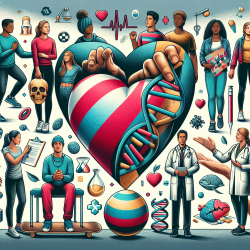Introduction
Sudden cardiac death (SCD) in young individuals is a rare yet devastating event that profoundly impacts families, friends, and communities. The psychosocial implications of such events are significant, often leaving a lasting emotional burden on those affected. Recent research, as discussed in the article "Shock to the Heart: Psychosocial Implications and Applications of Sudden Cardiac Death in the Young," highlights the need for healthcare practitioners to better understand and address these psychological complexities.
Understanding the Psychosocial Impact
The research emphasizes the importance of recognizing the emotional and psychological challenges faced by individuals at risk of SCD, as well as those directly affected by such events. The unexpected nature of SCD often leaves families and communities in shock, grappling with feelings of loss, injustice, and fear. Practitioners must be aware of these reactions to provide effective support and intervention.
Implementing Screening and Prevention Strategies
Screening initiatives aimed at identifying at-risk individuals are crucial in reducing the public health impact of SCD. However, the psychological consequences of the screening process, particularly among young individuals, must be considered. Genetic testing and familial screening can help determine potential disease expression and clarify genetic risks, but they also pose psychological challenges. Practitioners should be prepared to offer counseling and support to help individuals navigate these complex emotions.
The Role of Multidisciplinary Care
The research underscores the need for a multidisciplinary approach to managing the psychosocial burden associated with SCD. Collaboration between cardiovascular and psychological experts is essential in providing comprehensive care. This approach should include genetic counselors, psychologists, and other specialists to address the diverse needs of affected individuals and families.
Encouraging Further Research
While current knowledge provides a foundation for addressing the psychosocial implications of SCD, there is a pressing need for further research. Practitioners are encouraged to contribute to this growing body of knowledge by exploring innovative strategies for prevention, support, and intervention. By doing so, they can enhance their skills and improve outcomes for those affected by SCD.
Conclusion
The psychosocial impact of sudden cardiac death in young individuals is profound and multifaceted. Practitioners play a critical role in supporting affected individuals and families through screening, prevention, and intervention strategies. By embracing a multidisciplinary approach and engaging in further research, healthcare providers can better address the emotional and psychological needs of those impacted by SCD.
To read the original research paper, please follow this link: Shock to the Heart: Psychosocial Implications and Applications of Sudden Cardiac Death in the Young.










